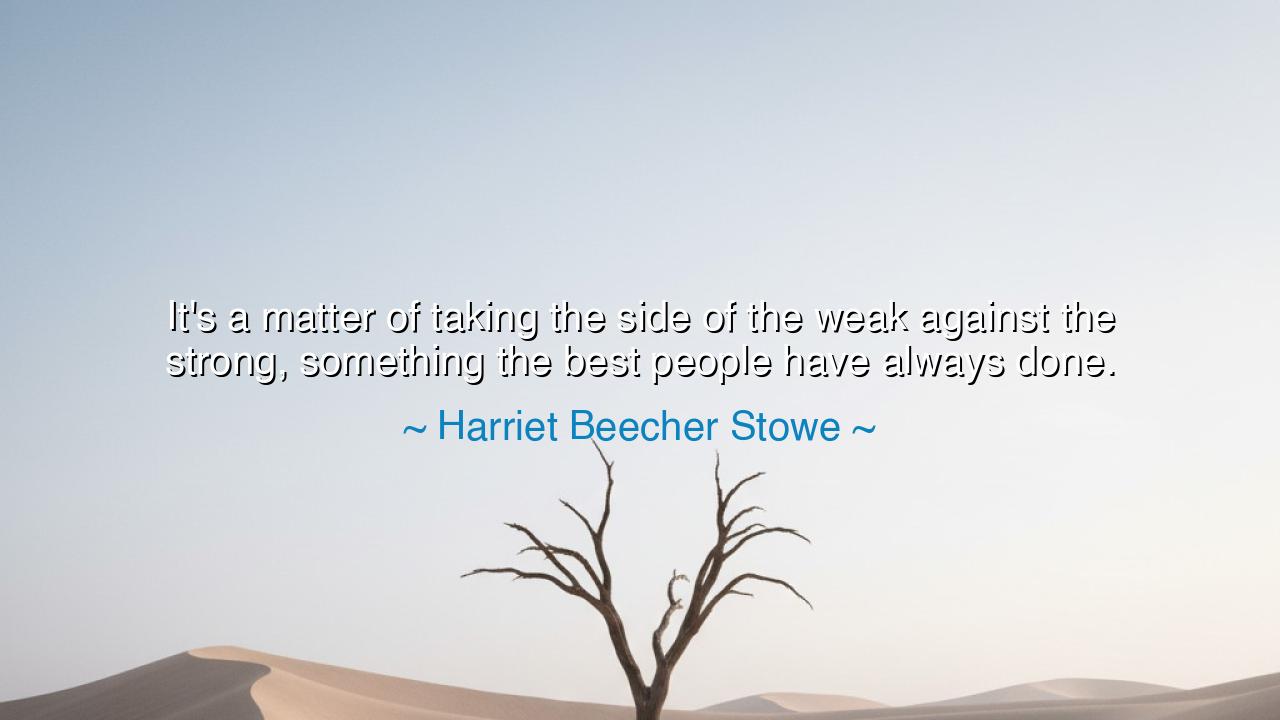
It's a matter of taking the side of the weak against the strong
It's a matter of taking the side of the weak against the strong, something the best people have always done.






Host: The soft glow of the evening filled the room, casting gentle shadows as the world outside grew still. Jack sat at the table, his cup of tea resting lightly in front of him, absorbed in thought. Jeeny stood near the window, her arms loosely crossed, reflecting on the words of Harriet Beecher Stowe.
Jeeny: “I’ve been thinking about what Harriet Beecher Stowe said: ‘It’s a matter of taking the side of the weak against the strong, something the best people have always done.’ It’s such a powerful statement, isn’t it? The idea that true strength lies in compassion—in standing with those who are vulnerable, rather than siding with the powerful who already have influence.”
Jack: “Yes, it’s a reminder of the moral responsibility we have to help those who are less powerful. Stowe is making the point that the best people—those who are truly noble—aren’t the ones who use their power for their own gain, but the ones who use their power to defend the defenseless. It’s a matter of ethics, not just strength.”
Jeeny: “Exactly. Stowe shows us that justice isn’t about favoring the strong—it’s about equality and fairness. The real measure of a person’s character is how they treat those who have less power, those who are oppressed or vulnerable. In a way, it’s a call to action for us to recognize the inequalities around us and stand against them.”
Host: The stillness in the room deepened, as they both reflected on the idea that true strength is not just about physical power or influence, but about the ability to stand up for others, especially those who are often silenced or overlooked. Jack’s fingers rested lightly on the table, and Jeeny’s gaze softened as she thought about how often people are conditioned to favor the strong and powerful.
Jack: “It makes me think about how society often elevates the powerful, the successful, the ones with wealth or status, as if they are the role models. But Stowe is reminding us that the true measure of greatness is in our compassion, in our ability to support those who are less fortunate. It’s not about how much power we have—it’s about how we use that power to lift others up.”
Jeeny: “Yes, and I think that’s what makes Stowe’s words so enduring. She’s talking about empowerment, but not in the sense of gaining power for ourselves. It’s about using whatever power we have to protect those who have none. Best people, in this context, aren’t those who amass wealth or fame—they’re the ones who fight for the downtrodden, who stand up for the voiceless.”
Jack: “And it’s not always easy, is it? Standing with the weak means going against the powerful, and that’s often where the real challenge lies. It’s about choosing integrity over convenience. It’s easy to side with the strong when it’s in our best interest, but it takes courage to stand with those who have nothing to offer in return.”
Jeeny: “Exactly. That’s what makes it so powerful—Stowe is showing us that true moral character is about standing for what’s right, not what’s easy or beneficial for us. It’s about sacrifice, about giving a voice to the voiceless, and making sure those who are vulnerable aren’t left behind.”
Host: The room felt even quieter now, the weight of their conversation settling in. The understanding that true strength lies not in siding with the powerful but in standing with the weak—those who have no voice or power—had taken root. Jack leaned back slightly in his chair, while Jeeny’s gaze softened, lost in thought about how often society gets caught up in valuing power over compassion.
Jack: “So, what Stowe is showing us is that the real measure of character is in how we treat those who have no power. It’s not about how much influence we have—it’s about how we use that influence to create a fairer, more just world.”
Jeeny: “Exactly. Stowe’s words are a reminder that the best people are the ones who fight for what’s right, not just for themselves, but for those who need help the most. It’s about choosing to stand with the vulnerable, the oppressed, and ensuring their voices are heard.”
Host: The conversation had fully settled in, leaving behind a quiet understanding that true greatness comes not from personal success or power, but from the courage to stand for what’s right, to defend those who cannot defend themselves, and to fight against injustice. Harriet Beecher Stowe’s words had reminded them both that compassion and integrity are the true measures of strength, and that the real heroes are those who stand with the weak and challenge the powerful. The world outside had darkened, but inside, there was light—a realization that the path to true greatness lies not in power, but in empathy, justice, and solidarity.






AAdministratorAdministrator
Welcome, honored guests. Please leave a comment, we will respond soon